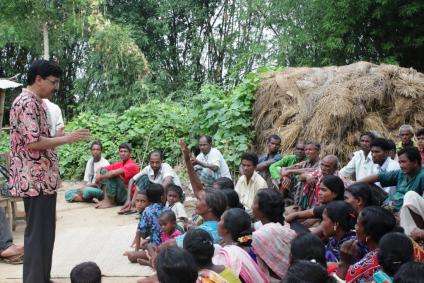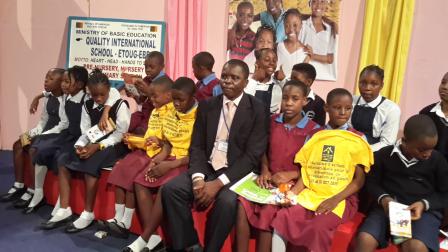IPEN Activities
IPEN and its Participating Organizations engage in a wide variety activities to eliminate lead in paint and raise widespread awareness about the adverse human health impacts of lead-based decorative paints, particularly on the health of children under six years old.
IPEN works with IPEN Participating Organizations to conduct periodic testing of paints, discuss lead paint elimination with small and medium size paint manufactures, work with governments to develop and implement mandatory lead paint standards and, where possible, develop and implement independent, third-party paint certification programs.
Asian Lead Paint Elimination Project
IPEN's Asian Lead Paint Elimination Project is working to eliminate lead in paint in more than 11 Asian countries. Lead elimination projects were begun in seven countries (Bangladesh, India, Indonesia, Nepal, Philippines, Sri Lanka, and Thailand), through a three-year grant, funded by the European Union. Additional lead paint testing is now underway in a number of other Asian countries.
African Lead Paint Elimination Project
IPEN’s African Lead Paint Elimination Project is a 2.5-year project to eliminate lead in paint in four countries: Cameroon, Côte d'Ivoire, Ethiopia, and Tanzania. The Project is funded by the Global Environment Facility with the United Nations Environment Programme as the Implementing Agency and IPEN as the Executing Agency. The project includes analytical studies of lead content of paints, public awareness activities, support for national legislation and paint industry engagement. The project will also facilitate start-up activities for lead paint elimination in a few additional African countries.
GEF SAICM Lead Paint Project
The Latin America and the Caribbean regional workshop on generating support for phasing out lead took place on 12 & 13 June 2019, in Panama City, Panama. Five IPEN Participating Organizations (POs) from five different countries participated in the workshop. The group included representatives from Latin American and Caribbean governments, the UN Environment, World Health Organization, the American Bar Association Rule of Law Initiative, technical experts from the US Environmental Protection Agency, the International Paint and Printing Ink Council, and National Cleaner Production Centers.
Read more at IPEN Participating Organizations voice concerns about lead in paint in Latin America and the Caribbean
IPEN Participating Organizations (POs) from Jordan, Bangladesh, Pakistan, Indonesia, Malaysia and Vietnam actively met in Bangkok, Thailand on August 21-22, 2019, at a workshop conducted in support of the Global Alliance to Eliminate Lead Paint under the auspices of the “Global best practices on emerging chemical policy issues of concern under the Strategic Approach to International Chemicals Management" (SAICM) funded by the Global Environment Facility (GEF).
Among the participants were environment, health and trade officials from the governments of Lebanon, Jordan, Bangladesh, Pakistan, Cambodia, Laos, Vietnam, Malaysia, China, Mongolia and Fiji; paint industry representatives from Malaysia and the Philippines; NGOs from the IPEN network; and the GEF-SAICM Lead Paint Project Executing Partners and Advisers from the United Nations Environment Programme (UNEP), World Health Organization (WHO), US Environmental Protection Agency (EPA), American Bar Association-Rule of Law Initiative (ABA-ROLI), and IPEN.
Read more at IPEN POs Emphasizes Civil Society Role in the Elimination of Lead Paint in Asia-Pacific
International Lead Poisoning Prevention Week:
2021
Forty-eight IPEN Participating Organizations (POs) from 35 countries took part in the International Lead Poisoning Prevention Week (ILPPW) on 24-30 October 2021. With the theme “Working Together for a World Without Lead Paint,” various activities were carried out to emphasize the need to accelerate progress toward the global phase-out of lead-containing paints through regulatory and legal measures. Additionally, IPEN organized a webinar on “Catalyzing the Global Phase-Out of Lead Paints,” to discuss how listing lead pigments in the Rotterdam Convention will advance global lead paint elimination; help countries adopt and enforce lead paint control regulations; and make exporting countries assume major responsibilities for the control of lead pigments and the lead paints that contain them. IPEN also released a policy statement on the continued use of lead in paint and other products.
2020
Despite the challenges posed by the COVID-19 pandemic, 41 IPEN participating organizations (POs) from 36 countries participated in the 8th edition of the International Lead Poisoning Prevention Week on October 25 to 31, 2020. Civil society groups conducted activities, including policy meetings, public information dissemination and media outreach, to push for the adoption and/or enforcement of strong lead paint laws. The week-long campaign led by the Global Alliance to Eliminate Lead Paint (Lead Paint Alliance), which includes IPEN and several of its POs from low- and middle-income countries, seeks to hasten progress toward the goal of phasing out lead paint across the globe through regulatory and legal measures.
For more information about IPEN POs’ activities, please see the 2020 ILPPW report.
2019
The Global Alliance to Eliminate Lead Paint organized the 7th International Lead Poisoning Prevention Week from 20-26 October 2019. Through its multi-lingual resource pack, campaign videos, factual information and other materials, the Alliance aimed to support individuals, civil society organizations, industry and governments to work together to ban lead paint.
A total of 89 events were registered on the WHO website. The events were held by 81 organizations in 57 countries. NGOs organized the largest number of registered events, accounting for 66%, and government bodies organized 12% of events. Forty IPEN participating organizations from 36 countries participated in the Week of Action and organized various activities to raise awareness and promote actions, such as the adoption and enforcement of laws banning lead paint, to address the human health effects of lead exposure, especially for children. Please see information about IPEN organizations' activities in the 2019 Week of Action.
2018
Over 30 IPEN organizations participated in the 2018 International Lead Poisoning Prevention Week of Action (21 - 27 October), sponsored by the World Health Organization (WHO) and United Nations Environment. This is the sixth year that IPEN played a strong role in the Week. Please see information about IPEN organizations' activities in the 2018 Week of Action. 35 events were organized by IPEN in 32 countries, and information about these activities can also be viewed in IPEN’s 2018 lead newsletter.
The World Health Organization, UN Environment, and Global Alliance to Eliminate Lead Paint (GAELP) put together a resource package as guidance through the week, and also provided a Question and Answer session about lead paint and health.
2017
Many IPEN organizations participated in the 2017 International Lead Poisoning Prevention Week of Action, sponsored by the World Health Organization (WHO) and United Nations Environment. Please see information about IPEN's participation in the 2017 International Lead Poisoning Prevention Week of Action, which took place 22 - 28 October, 2017, here. Forty-one events were organized by IPEN in 37 countries, and information about these activities can be viewed in IPEN’s 2017 lead newsletter.
The World Health Organization, UN Environment, and Global Alliance to Eliminate Lead Paint (GAELP) put together a resource package as guidance through the week. Find a resource for campaign materials here. Find resources for meetings and events for the week here.
2016
Many IPEN organizations participated in the 2016 International Lead Poisoning Prevention Week of Action, sponsored by the World Health Organization (WHO) and United Nations Environment Programme (UNEP). Thirty-three events around the world were organized by IPEN, and information about them can be viewed in IPEN's 2016 lead newsletter.
2015
Many IPEN organizations participated in the 2015 International Lead Poisoning Prevention Week of Action, sponsored by the World Health Organization (WHO) and United Nations Environment Programme (UNEP). Some of the week’s activities can be viewed here.
2014
Many IPEN organizations participated in the 2014 International Lead Poisoning Prevention Week of Action, sponsored by the World Health Organization (WHO) and United Nations Environment Programme (UNEP). The week’s activities included production of a short film focused on lead and its hazards on human health in India, press releases and interviews on television stations in Cameroon and Nepal, and actions urging the government to ban the production and import of lead containing paints to ensure a safe environment and future in Bangladesh, amongst others.
2013
IPEN organizations in thirty countries participated in the 2013 International Lead Poisoning Prevention Week of Action, sponsored by the World Health Organization (WHO) and United Nations Environment Programme (UNEP). The week’s activities included the release of a new report from IPEN and UNEP documenting lead in paint in nine, geographically diverse countries and new national reports analyzing lead in paint in a number of other countries.
Global Alliance to Eliminate Lead Paint
IPEN participates in the Global Alliance to Eliminate Lead Paint, a global partnership to eliminate lead in paint co-chaired by the World Health Organization (WHO) and the United Nations Environment Programme (UNEP).
Bringing Lead Paint Awareness to the first UN Environment Assembly
UN Environment UNEA-1 Coverage features IPEN Lead Paint Advisor, Sara Brosche, talking about the need for lead paint regulation in countries around the world.
Debug project variant
Debug project variant







